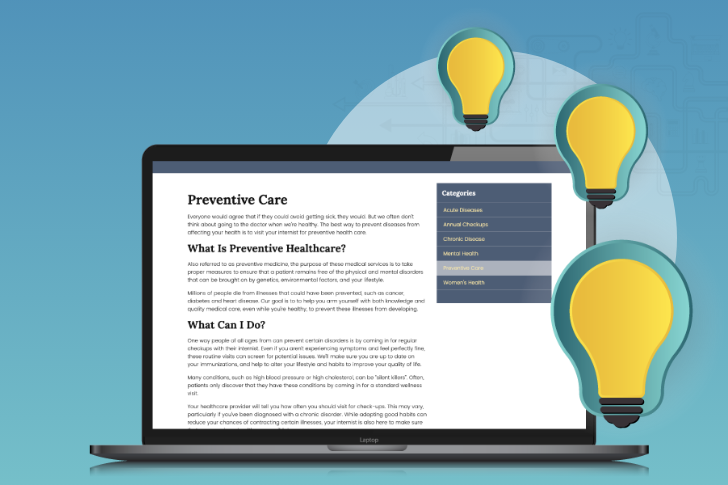
In the past, word-of-mouth referrals and repeat patients were the most reliable ways to grow and sustain any medical practice. But in the age of the internet, online strategies are now the number one way to market healthcare services.
More and more people are turning to Google to help them find the medical care they need. With that in mind, SEO for doctors can help private practices reach a wider audience, find new patients, and build a trusted digital presence that lasts.
So, what is SEO? The term stands for “search engine optimization,” and it relates to how well your website ranks on Google searches. You have likely used Google to find a service or product yourself. Those companies also use SEO to show up in early rankings. You can boost your practice’s SEO by building a high-quality website and creating excellent content, but the process can be a bit complicated and labor-intensive. For this reason, many healthcare providers hire marketing agencies to handle SEO for them so that they can focus on what matters most — their patients.
However, even if you decide to go it alone, you can use SEO to start growing your web presence as a physician and reach more people looking for your services in your city.
How Important Are Search Engines? Google It
Search engines are the most popular way to find information. An ever-increasing number of people search for medical websites and providers online, often choosing those who appear near the top of the Google search results. So, if you’re a physician who wants to grow your business, an SEO-friendly web presence is vital.
With proper SEO, search engines can find (index) your practice’s address, phone number, and other contact information for people who need your services the most. This makes it easy for potential patients to reach out to you for appointments or questions.
Additionally, search engines will show your practice’s reviews to users, which can help you build a positive reputation in your community. According to a 2020 survey, a whopping 79% of people trust online reviews as much as personal recommendations from friends and family. As you start to collect good reviews, potential patients will see them and trust your practice more — without ever stepping foot in your facility.
SEO is priceless for any medical practice’s long-term success. It allows you to generate more web traffic, build a positive reputation, and become more established throughout your community.
SEO Helps You Reach Searchers With Intent
The importance of SEO goes beyond just getting your private practice’s information out there. When you properly optimize your medical website, you’ll appear at the top of Google search results for patients searching with intent to make an appointment with a doctor.
For example, as a cardiologist, SEO can put you at the top of the search results when someone types “cardiologist near me” into Google or another search engine. Anyone searching for that term is likely considering booking an appointment with a cardiologist, and proper optimization helps put your practice right in front of them.
Traffic Is a Good Thing When It Relates to Your Medical Website
It’s estimated that 97% of people learn more about local businesses on the internet than they do anywhere else. High web traffic is crucial for any business because it translates into clients, and in the case of medical providers, patients.
Medical websites that appear at the top of Google are more likely to be clicked and book patients. What’s more, research has shown that 75% of internet users don’t even click past the first page when viewing their search results. That means getting your website to the top of the search results is one of the best things you can do for your private practice’s success.
While SEO for doctors and practices can be a long process, the traffic generation benefits can add up for years to come.
SEO Statistics
When considering whether to optimize your medical website, here are some important SEO statistics to think about:
- 76% of people who search for something nearby visit a business that appeared in their search within a day. For medical providers, a high ranking on Google can directly translate to same-day calls to book appointments.
- Your brand awareness can increase by 46% simply by showing up early in search results.
- 51% of smartphone users have discovered a new business or product when searching on their phone.
- 72% of internet users in the U.S. have used a search engine to learn more about a health question in the past year.
With these numbers in mind, it’s easy to see how valuable search engine optimization is for helping potential patients find your practice.
Overall, higher traffic on your page equals better results. You’ll receive more calls, contact form submissions, and appointments. Beyond that, people who discover your practice through a search engine may even recommend your services to friends and family.
Become the Leader for Lead Generation
SEO can bring more eyes to your private practice’s website, but if you want to take your digital marketing a step further, you can use the increased web traffic to generate qualified leads on potential patients.
Many people are at different stages of their health journey. Some may be looking for professional health advice, but aren’t quite ready to head to the doctor yet. They might have questions about symptoms or conditions in your realm of expertise. You can attract these people to your website by answering their questions with high-quality, relevant content on your website.
Once users are on your website, offer them guides on different conditions, access to free webinars, or other relevant, downloadable content (something of value) in exchange for their email address. Then you can continue to provide them with free, useful content straight to their inbox.
These prospective patients may not need to book an appointment right now. But with a well thought out lead generation strategy in place, your practice can remain top of mind as both a medical provider and reliable resource for their health.
Traffic Goes Up, Costs Go Down
The truth is that it often takes time to see the results of SEO in your practice. That doesn’t mean it isn’t worth it. Unlike traditional advertising campaigns, SEO is a stable, slow-growing form of marketing that will bring you higher traffic for years to come. With increased traffic, you’ll be able to spend less money on other forms of marketing later on. People searching for doctors will come across your site organically thanks to the web presence that you’ve built over time.
Increased web traffic can make a world of difference for any business — and it’s much more cost effective than continuously running ads or cold calling to gain new patients.
Effectiveness of SEO Compared to Other Forms of Marketing
Here are a few of the things you can expect from SEO compared to traditional web advertisements:
- You will build authority around your business. If your website appears at the top of Google’s search results, it lends a sense of credibility and trust to your practice’s name.
- You can generate valuable leads at a lower cost over time. With more potential patients viewing your site, you have more opportunities to build relationships through email marketing.
- Search engine optimization provides a long-lasting bang for your buck. SEO is a strategy designed to produce results over time. Unlike ads that only run for a few days or weeks, it can help patients find you on Google and other search engines for years to come.
All of this is not to say that Google ads or pay-per-click campaigns aren’t useful. In fact, they’re also great forms of marketing for medical websites. But overall, the best strategy for bringing in new patients is a combination of different marketing avenues, and SEO for doctors plays a significant role in that success.
The Bottom Line on SEO for Doctors
If you’re a physician who wants to grow your private practice, digital marketing and SEO may not be the first things that come to mind. All healthcare practices need effective strategies to build their reputations and bring in patients. And with so many people using search engines to find medical services near them, SEO is one of the best strategies a physician can invest in.
A well-optimized website that ranks high in search results promotes trust and generates a stable flow of traffic that evolves into leads and new patients down the line. It can help you fill your appointment book effortlessly and spend less money on outbound marketing in the future.
If you want to get started building your company’s online presence, Officite is an option that offers expert service packages to help you create a website that ranks on Google. You’ll receive an SEO-optimized medical website, access to a doctor’s portal, HIPAA compliant email and forms, and more.
Click here to learn more about our packages and pricing, or book a consultation today.






